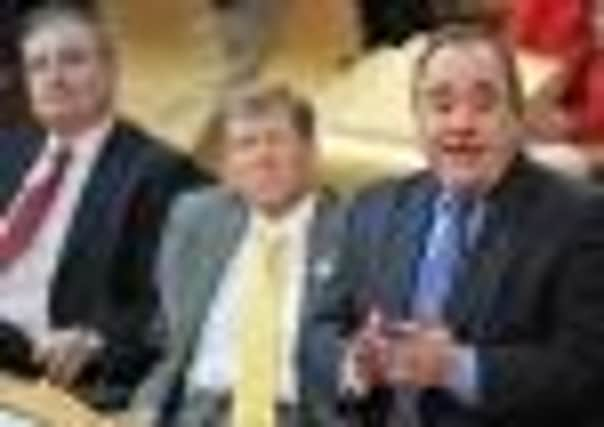Scottish independence referendum: Alex Salmond seeks ‘consensus’ on vote


Mr Salmond has been at odds with Westminster and opposition parties at Holyrood over his plans for a vote on Scotland’s constitutional future.
Earlier this week, his Scottish Government announced the autumn of 2014 was its preferred date for the ballot.
Advertisement
Hide AdAdvertisement
Hide AdBut the unionist parties have accused him of delaying the vote, urging him to hold it sooner rather than later.
The UK Government has also insisted the SNP administration does not have the legal powers to hold a referendum on the constitution.
While Scottish Secretary Michael Moore offered to temporarily extend Holyrood’s powers to allow a referendum to be held, the Nationalists have rejected the “strings” they claim are attached.
Today, Mr Salmond said he had “every interest in making sure we have a consensus on the process” of a referendum.
The First Minister said he would make “every effort” to achieve this, saying this was “because I am anxious, like I hope every other member in this chamber is, to get to the nub of the argument, to let the Scottish people decide their own future”.
Mr Salmond also insisted that the independence poll should be open to people as young as 16, overseen by a special Scottish body, and be decided by people on the Scottish electoral roll.
Speaking on behalf of the Scottish Government, Mr Salmond criticised Labour’s position - particularly for backing votes for 16 and 17-year-olds in the referendum on voting reform, but not for the independence ballot.
He also urged Labour leader Johann Lamont to consider allowing a further option on the ballot paper, possibly to give Scotland maximum devolution short of independence.
Advertisement
Hide AdAdvertisement
Hide AdHe spoke out after being pressed on the issue by Ms Johann Lamont, who urged him to be a “national leader” and ensure that there was a “free and fair referendum that everyone in this country can trust”.
She highlighted the “calls for us to come together on the process around the referendum” and urged Mr Salmond: “Will the First Minister accept the responsibility here to be a national leader?”
Ms Lamont also called on the SNP leader to “make sure he is not operating simply as party leader” and to “deliver and play a part in a free and fair referendum that everyone in this country can trust and will accept the day after the vote has been taken”.
During the highly-charged debate, Labour and the SNP both attempted to paint each other’s party as being close to the Tories.
Ms Lamont was reminded of a newspaper quote where she said Labour is “on the same page” as the Tories on the referendum issue. In turn, she accused the SNP of “delivering” Thatcher to the country.
Mr Salmond also cast his memory back to the late 1970s, highlighting the previous involvement of a Westminster government in a Scottish referendum.
He referred to a controversial bar imposed on the first devolution referendum which meant 40% of the electorate had to vote “yes”. The limit was not achieved, even though more people voted in favour.